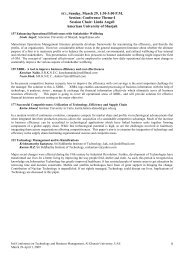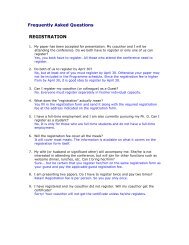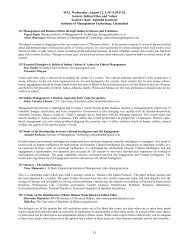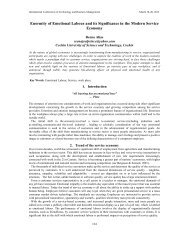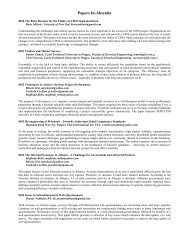Contributed Papers - Icmis.net
Contributed Papers - Icmis.net
Contributed Papers - Icmis.net
Create successful ePaper yourself
Turn your PDF publications into a flip-book with our unique Google optimized e-Paper software.
3A-7, Monday, January 3, 9:20-11:00 A.M.<br />
Session: OB-III<br />
Session Chair: Shabnam Priyadarshini<br />
Centre for Management Training & Research<br />
8543 Journey towards Excellence -Innovative Atmosphere leading to Success of Managers<br />
Sachin Ghai, Graphic Era University, sir.sachin.ghai@gmail.com<br />
Rameshwar Dubey, Asian Council of Logistics Management, rameshwardubey@gmail.com<br />
In this study the relationship between the role of innovative intermediaries in a conversion leadership style and innovative<br />
behavior of managers and staff is investigated. Research findings confirm the relations between innovative intermediaries and<br />
intellectual arousal, motivation inspiration, thoughtful individual with innovative behavior (01 / 0> p), but the relation between the<br />
role of innovative intermediaries and creative ideals and the influence of systematic problem solving style on innovative behavior<br />
(01 / 0> p) was not confirmed.<br />
8546 Organisational Learning & Employee Attitude towards Change: An empirical study<br />
Vaijayanthi Panchanathan, SASTRA University, panchanathanvaijayanthi@gmail.com<br />
Change is a major issue, affecting individuals, groups, and organizations. Organizations have invested in multifarious<br />
interventions in an attempt to implement successfully change initiatives. Research confirms "Learning Organizations" to be<br />
change conducive. Most of the existing studies empirically relate learning to the capacity for change .Very few studies examine<br />
empirically the relationship between Learning in organizations and Organizational readiness for change. This quantitative study<br />
examines empirically the relationship between Learning and Organizational readiness for change. Validated Instruments of<br />
Watkins & Marsick, and Dunham et al. were respectively used. The research was conducted using 175 sample participants from 7<br />
organizations.<br />
8557 Dimensions of Power Motivation: An Empirical Investigation<br />
Amandeep Sandhu, Centre for Management Training and Research, amandeepksandhu@gmail.com<br />
Jagat Jerath, Centre for Management Training and Research, jmjerath@gmail.com<br />
The objectives of this study were: (1) to identify the dimensions of power motivation in Indian adults, and (2) to observe if<br />
different demographic groups showed differences on these dimensions. Factor analysis on a range of power-related statements<br />
yielded six independent dimensions of the power motivation, viz., Personalized Power, Socialized Power, Authoritative Power,<br />
Power through Directing and Advising others, Popularity, and Manipulative Power. Differences among groups based on<br />
profession, work experience, age, and gender were found on these dimensions. It was concluded that power motivation could be<br />
more meaningfully employed in training and research as a multi-dimensional construct.<br />
8899 Mental Health Perspectives in Organizations: Issues and Challenges<br />
Sarvesh Satija, Birla Institute of Technology & Science, sarveshsatija@gmail.com<br />
Recent years have evinced growing concern about the mental health which is an integral part of health. In a positive sense, it is the<br />
foundation for well-being and effective functioning of an individual and a community. Mental Health, as a discipline, doesn’t<br />
finds it’s virtual presence in organizational behaviour and thus lacks significant attention in organizations. This paper tries to offer<br />
a comprehensive view on the mental health perspectives in organizational context. Moreover, it highlights the need for mental<br />
health policies and programmes in organizations for the comprehensive welfare of the employees.<br />
8900 Managerial Gender Role Stereotyping: A Universal Phenomena<br />
Shabnam Priyadarshini, Centre for Management Training & Research, shabnamp@gmail.com<br />
Studies in various countries have shown that managers are perceived to possess characteristics, attitudes and temperaments more<br />
commonly ascribed to men than to women in general. With an aim to determine the relationship between gender stereotypes and<br />
managerial characteristics, Schein Descriptive Index was administered to 520 postgraduate management students in Chandigarh.<br />
As in the earlier studies, the analysis was carried out using intra-class correlations. The results are very similar to the ones reported<br />
in earlier studies in USA, UK, Canada, Germany, Japan, New Zealand, and China.



